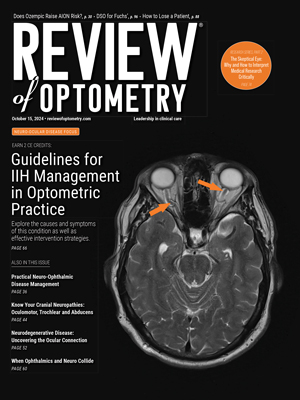A recent study found that the eye’s ability to respond to differences in lighting isn’t based completely on shifting pupil size. Researchers used a fixed 5mm pupil model to discover that retinal illuminance also reduces the subjective amplitude of accommodation based on the lighting stimulus range commonly encountered with reading.
This may have a significant impact on presbyopia therapies, the researchers note, as correcting the expanding a patient’s depth of focus by using an artificial small pupil in contact lenses may actually reduce the retinal illuminance, worsening their ability to accommodate.
The study measured the amplitudes of accommodation of 10 young subjects (between 20 and 38 years old) and that of 10 presbyopic subjects (between 45 and 54 years old). The study used a fixed 5mm pupil diameter, so the changes in stimulus luminance altered the neural sensitivity of the visual system but avoided any optical changes caused by pupil changes. The only optical changes experienced by the eye were those happening during accommodation, so differences in perception of the target were due to changes in neural effects produced by changes in retinal illumination.
In the range of illuminances tested, the amplitude of accommodation decreased on average from 6.34D to 4.35D in the young patients and from 1.69D to 1.04D in the presbyopic patients. The study found that illuminance was associated with the amplitude of accommodation in the two groups.
“Not having enough light could mean that a presbyopic patient may not be able to read at near distances as a consequence of their near point getting farther away from their eye because of dim lightning, even when their addition has been properly calculated at photopic levels,” the researchers noted in their paper. They concluded that lighting conditions, therefore, should be taken into account in the assessments, diagnostics and prescriptions performed the daily clinical practice.
Lara F, Del Águila-Carrasco AJ, Marín-Franch I, et al. The effect of retinal illuminance on the subjective amplitude of accommodation. July 28, 2020. [Epub ahead of print]. |

